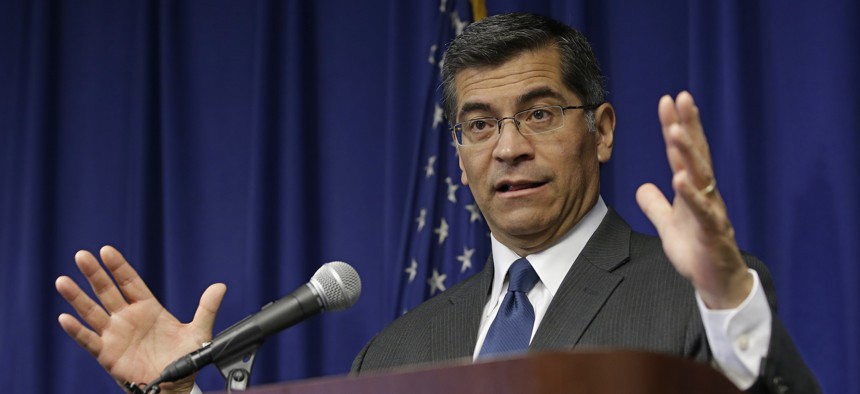Feds Sue to Block California Laws Protecting Immigrants

California Attorney General Xavier Becerra Rich Pedroncelli / AP Photo

Connecting state and local government leaders
Xavier Becerra, the state’s attorney general, says he’ll “stay the course and enforce all our laws and protect all our people.”
The Justice Department on Tuesday filed a lawsuit against California seeking to overturn three state laws enacted last year that Trump administration officials contend unconstitutionally interfere with federal immigration enforcement activities.
State leaders in California had anticipated that the lawsuit, filed in U.S. District Court in Sacramento, would be coming. It’s the latest flashpoint in ongoing tensions between officials in the Golden State and the Trump administration on a variety of issues, including immigration and sanctuary cities.
As the Los Angeles Times reported Tuesday:
The laws make it a crime for business owners to voluntarily help federal agents find and detain undocumented workers, prohibit local law enforcement from alerting immigration agents when detainees are released from custody, and create a state inspection program for federal immigration detention centers.
Administration officials, who briefed reporters before the suit was filed, said other states that are pursuing laws similar to California's are also likely to be targeted in court.
U.S. Attorney General Jeff Sessions is scheduled to speak before a meeting of the California Peace Officers Association in Sacramento on Wednesday.
The lawsuit, which names California Gov. Jerry Brown and state Attorney General Xavier Becerra as defendants, argues that the laws in question “reflect a deliberate effort by California to obstruct the United States’ enforcement of federal immigration law, to regulate private entities that seek to cooperate with federal authorities consistent with their obligations under federal law, and to impede consultation and communication between federal and state law enforcement officials.”
Becerra, a Democrat, tweeted on Tuesday night:
“We’ve seen this B-rated movie before, so I’m not totally surprised,” Becerra said during a conference call with reporters on Tuesday, according to The Mercury News. “The arguments that the administration is making . . . demonstrate there’s nothing really new there that we aren’t already familiar with.”
Brown, in a statement released Tuesday night, described the federal action as a stunt and said that at “a time of unprecedented political turmoil, Jeff Sessions has come to California to further divide and polarize America.”
The Democratic governor also highlighted his Oct. 5 signing statement upon approving S.B. 54, the California Values Act, which “clearly spells out what California law does and doesn’t do.”
According to the signing statement:
This bill states that local authorities will not ask about immigration status during routine interactions. It also bans unconstitutional detainer requests and prohibits the commandeering of local officials to do the work of immigration agents. The bill further directs our Attorney General to promulgate model policies for local and state health, education, labor and judiciary officials to follow when they deal with immigration matters.
In enshrining these new protections, it is important to note what the bill does not do. This bill does not prevent or prohibit Immigration and Customs Enforcement or the Department of Homeland Security from doing their own work in any way. They are free to use their own considerable resources to enforce federal immigration law in California. Moreover, the bill does not prohibit sheriffs from granting immigration authorities access to California jails to conduct routine interviews, nor does it prevent cooperation in deportation proceedings for anyone in state prison or for those in local jails for any of the hundreds of serious offenses listed in the TRUST Act.
During remarks he made before the National Association of State Attorneys General in late February, Sessions noted that legal actions taken by states and cities against the Trump administration have led to 20 nationwide injunctions, more than any other presidential administration. As Route Fifty reported, Sessions vowed to defend presidential powers in court against those legal actions.
“I do recognize that our different chief executives and attorneys general have different priorities,” Sessions said. “We’re prioritizing crime and criminal justice enforcement.”
Michael Grass is Executive Editor of Government Executive’s Route Fifty and is based in Seattle.

NEXT STORY: FEMA Wants Counties to Take Charge of Pre-Disaster Logistics





